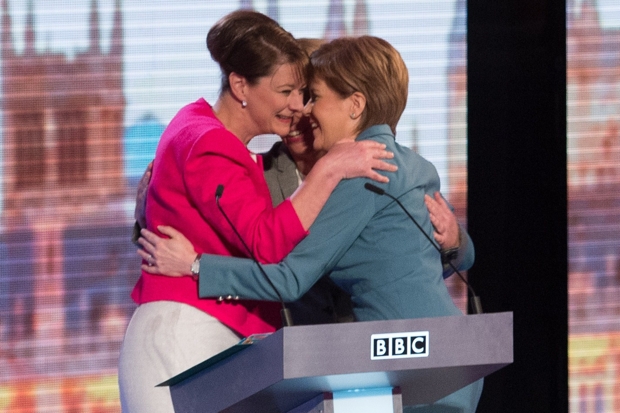If I were a nicer person, I suppose I’d have been rather more moved by what the Independent called the moment that summed up last night’s leaders debate, the ‘beautiful group hug’ by the three women leaders at the end while Ed Miliband looked on. Rather, it summed up for me what I felt about the entire event, that it was a slightly embarrassing affair for women whose approach to politics is anything other than the sort of thing espoused by Greece’s radical left-wing party Syriza. If you take seriously the notion that the deficit is something to be addressed rather than put on hold, that the national debt is something to be talked about rather than an error of taste to be mentioned, well, the spectacle of the three women, Nicola Sturgeon, Natalie Bennett and Leanne Wood – none of them English – more or less spitting out the word ‘austerity’ and brightening up at the mention of ‘immigration’ was not a happy one. It would have suggested to male voters that women don’t quite get economics other than the tax and spend sort, that they’re too squeamish to touch nuclear defence and too nice to think about immigration in terms of numbers rather than lovely doctors and nurses from overseas who keep the NHS going. Their treatment of Nigel Farage, I thought, was a disgrace; he was the pariah that the three preferred not even to mention by name, left untouched while they advanced on Ed Miliband, hands outstretched.
Actually, it’s not irrelevant that the women aren’t English. When it comes to the question of immigration – which I happen to think, like lots of voters, is one of the two biggest of this election – it’s not coincidental that Wood and Sturgeon represent countries other than England, where immigration just isn’t much of a problem. Most immigrants don’t make for Dundee or Aberystwyth, not in unmanageable numbers; there isn’t in Scotland or Wales the equivalent of somewhere like Dewsbury or Bethnal Green, the kind of places that furnish recruits for Islamic State. As for Bennett, she’s meant to be a bloody Green. Did she not take on board Farage’s unanswerable point that the dramatic expansion of housing is down to demand as well as supply, and if you don’t deal with the numbers coming to the country – net foreign migration was just over a third of a million for the last year for which figures are available – then you are going to get green places carpeted with housing estates at the expense of, er, the environment. The women seemed puzzled by the idea that there is more to the housing issue than just building more houses.
Actually, they did have some cogent points. Bennett made the embarrassingly obvious point that the issue of Islamic State does have something to do with the sponsor states in the region, including Britain’s ally and consumer of its defence products, Saudi Arabia. Sturgeon did intimate that there was a problem with conventional defence numbers – though she was more keen to emphasise that money saved on Trident would be spent on doctors and nurses. And Wood did make the point that you can’t fight Isis with Trident. Dead right, Leanne.
As for Farage, he could do more with the question of immigration if he could occasionally focus on the reality that most immigration is from outside the EU; controlling non-EU immigration matters, I’d say, for most voters. And although it was probably a dud move to complain about the composition of the audience, it was indeed remarkably, discernibly, biased.
But on the whole, this was a bad night for women, because it confirmed some damaging and unhelpful female stereotypes. The commentator John Pienaar observed admiringly at the end that the spectacle of the three women was a wonderful contrast to the male dominated environment at the Commons; well, depends on where you’re coming from really. My own sentiment was: not in my name, girls.







Comments